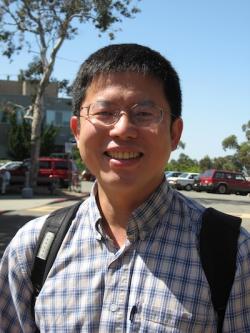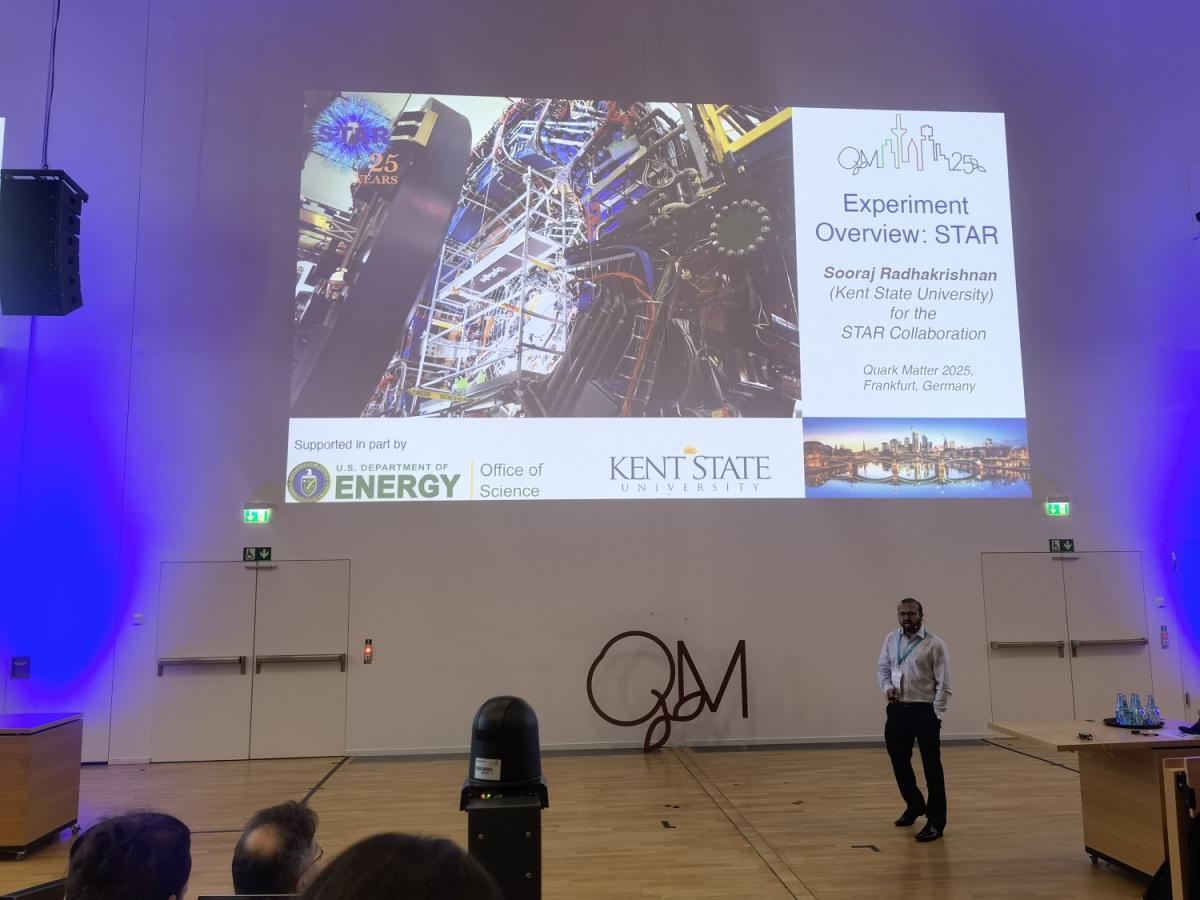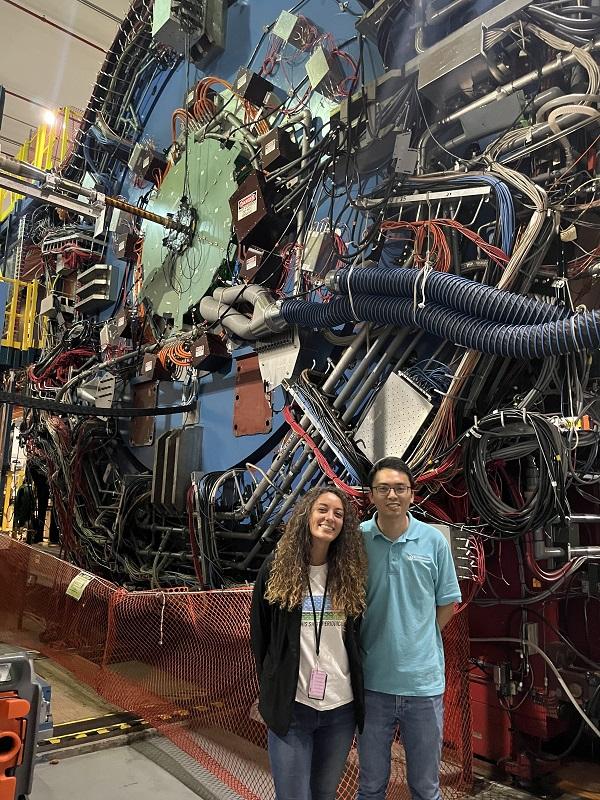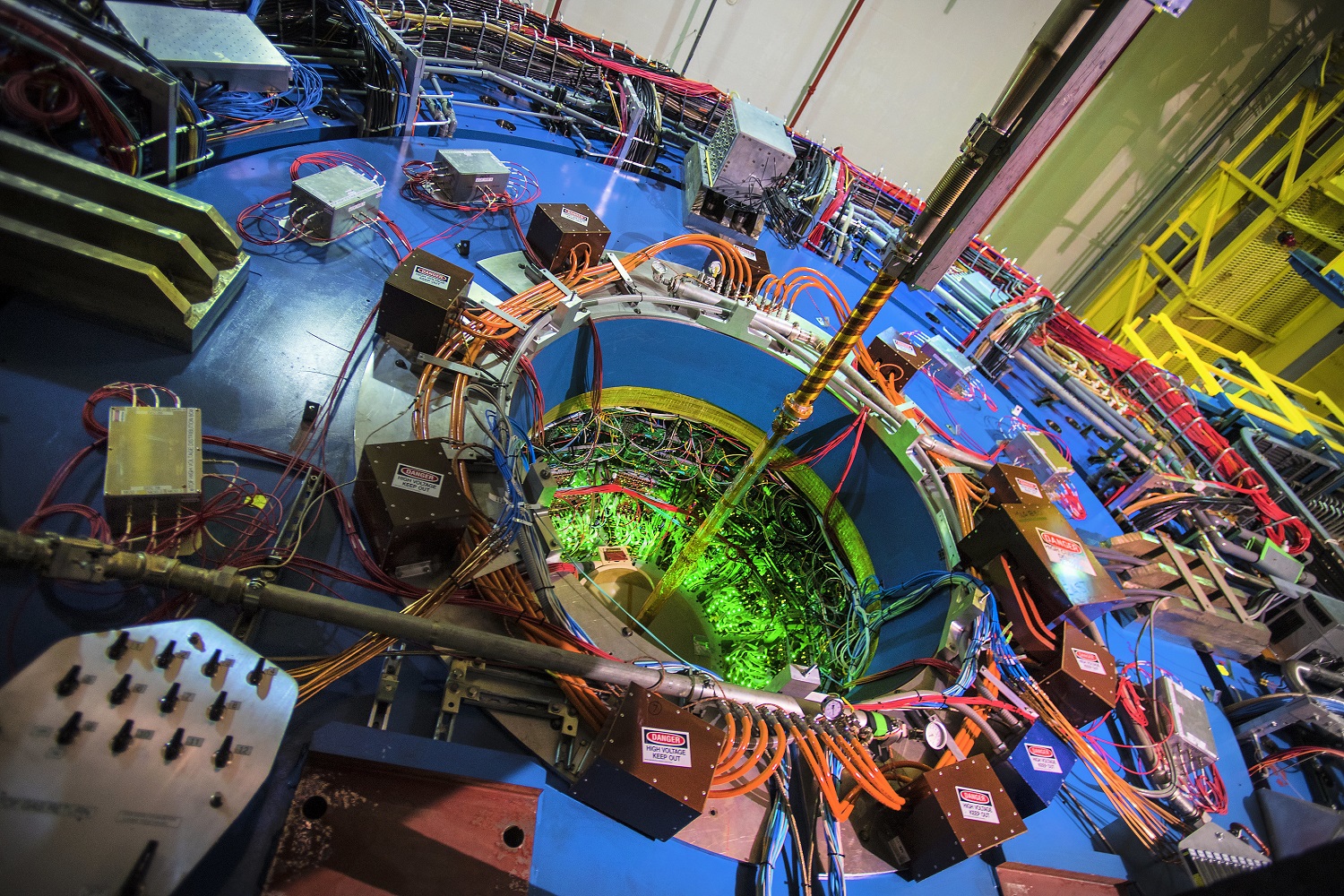, in New York, is home to some of the most exciting work in nuclear physics today. Two rising stars from ┼Š┼Š└▓, doctoral student Maci Kesler and research scientist Sooraj Radhakrishnan, are on the cutting edge of high-profile scientific research collaborations through Brookhaven which advance our understanding of our universeŌĆÖs early moments.

Both work with Zhangbu Xu, Ph.D., professor at ┼Š┼Š└▓ State in the Department of Physics, in the College of Arts and Sciences, with a research focus in high-energy nuclear physics. Their research connects ┼Š┼Š└▓ State to groundbreaking projects that explore the conditions of the universe just moments after the Big Bang.
Xu joined ┼Š┼Š└▓ State just over a year ago, but he has had close ties to ┼Š┼Š└▓ State research due to his collaborations with retired Professors Declan Keane, Ph.D. and Spiros Margetis, Ph.D. who were both long-term members of ┼Š┼Š└▓ StateŌĆÖs Center of Nuclear Research and the .
ŌĆ£WeŌĆÖre not just doing classroom physics,ŌĆØ Xu said. ŌĆ£WeŌĆÖre helping build the future of experimental nuclear science.ŌĆØ
Shaping the Future of Experimental Science Through Leadership
Radhakrishnan has spent the last six years at ┼Š┼Š└▓ State and is already a key leader in the STAR Collaboration, a group of over 700 scientists from 15 countries. STAR studies how nuclear matter behaves under extreme temperatures and densitiesŌĆölike those found in the early universe or inside neutron stars.
Recently, Radhakrishnan gave a plenary talk at ŌĆöthe most prestigious event in his field. His presentation covered the Beam Energy Scan Program, a massive STAR project that maps out how matter behaves at different energy levels, and many other new results shown to the public for the first time.

ŌĆ£This is a significant honor, not only for Dr. Radhakrishnan but also for ┼Š┼Š└▓ StateŌĆÖs longstanding role in the STAR Collaboration since its founding in 1991,ŌĆØ Xu said. ŌĆ£SoorajŌĆÖs leadership and scientific insight are making a global impact.ŌĆØ
Radhakrishnan doesnŌĆÖt just do the research, in which he is an expert on analyzing the flow expansion and energetic particles escaping from the extremely hot and dense matter, he helps manage the collaboration itself. As physics analysis coordinator, he oversees multiple working groups, helps resolve scientific debates, and ensures the quality of STARŌĆÖs scientific output.
ŌĆ£ItŌĆÖs a lot of work,ŌĆØ Radhakrishnan admits, ŌĆ£but also very rewarding. You get to help shape the direction of a global scientific effort.ŌĆØ
Radhakrishnan was selected by the STAR International Collaboration as a plenary speaker at the Quark Matter International Conference in Frankfurt Germany, the largest series of conferences in the field. This was the first time a ┼Š┼Š└▓ State scientist was given this honor of representing the collaboration for a plenary talk at this conference in the last 30 years. In 1991, ┼Š┼Š└▓ State was one of the few founding institutions of the STAR Collaboration.
DOE Award Winner Paving the Way for Future Breakthroughs

Although Maci Kesler grew up in Tiffin, Ohio, her collegiate academic path began in Las Vegas, where she earned her bachelorŌĆÖs degree from UNLV. Today, her influence reaches all the way to Brookhaven. Now a third-year Ph.D. student, she is leading a highly specialized detector simulation project for a new particle accelerator scheduled to launch in the 2030s. The project is part of the U.S. Department of EnergyŌĆÖs ambitious plan to build the Electron-Ion Collider (EIC) at Brookhaven National Laboratory ŌĆö a next-generation facility designed to help scientists explore the inner structure of protons and neutrons.
KeslerŌĆÖs research focuses on improving a complex measurement method that had been mostly abandoned due to experimental detection challenges. Working closely with Brookhaven scientists, she found a new way to revive one of the ŌĆ£must-doŌĆØ projects in imaging the inner structure of heavy nuclei to understand how the strong-force carrier (gluon) behaves inside a large nucleus. Because of her expertise and leadership, she is now the main contact for this part of the, an international collaboration of over 1,000 scientists.
She is also a recipient of the prestigious from the Department of Energy, which supports her research and gives her opportunities to travel, collaborate and present her work.
ŌĆ£This recognition reflects MaciŌĆÖs dedication, intellect, and strong research capabilities,ŌĆØ Xu said. ŌĆ£It also showcases the high-caliber work being done by graduate students here at ┼Š┼Š└▓ State.ŌĆØ
ŌĆ£ItŌĆÖs huge for exposure and experience,ŌĆØ Kesler said. ŌĆ£This award lets me work more closely with national lab scientists and develop the skills I need to lead future projects.ŌĆØ
┼Š┼Š└▓ State Awarded Prestigious R1 Designation
With the release of the new 2025 Carnegie Classification of Institutions of Higher Education, ┼Š┼Š└▓ State has once again been awarded the prestigious R1 designation, recognizing ┼Š┼Š└▓ State as one of the top research universities in the nation. This esteemed classification, which the university first received in 2022, is a testament to ┼Š┼Š└▓ StateŌĆÖs commitment to excellence in research, innovation and scholarship.
The R1 designation is the highest level of research activity for doctoral universities, placing ┼Š┼Š└▓ State among an elite group of institutions known for their significant contributions to research and development and the training of Ph.D. students. With the Carnegie ClassificationsŌĆÖ new 2025 Research Activity Designations, ┼Š┼Š└▓ State is now one of seven universities in Ohio to be designated R1, along with Case Western Reserve University, Ohio State University, Ohio University, the University of Cincinnati, the University of Dayton and the University of Toledo. Only 187 universities in the nation have R1 status, placing ┼Š┼Š└▓ State in the top 5% of institutions with respect to research activity.
# # #
Media Contact:
Jim Maxwell, JMAXWEL2@kent.edu, 330-672-8028

